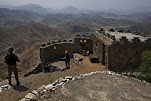Politics remains in flux, with PTI keeping up the pressure on the ruling coalition, while the economy - and the external account position in particular - remains vulnerable.
However, these top-down concerns are balanced against ultra-cheap valuations, with the market absorbing the surprise 100bps rate hike reasonably well and foreign investors turning net buyers in oil & gas exploration after a significant gap.
Analysts believe economic outlook takes precedence over political developments, with the former paramount in determining the near-term course of the KSE-100. The pending 9th IMF review is the key deriver.
Imran Khan had an eventful November, to say the least! He survived an assassination attempt, ended his march to Islamabad, and has threatened to dissolve the Punjab and Khyber Pakhtunkhwa provincial assemblies. The overall calculus remains the same, to force early general elections but there is some change in tack, with the US no longer blamed for his ouster, and a less combative stance adopted towards the army in the run up to the appointment of the new army chief.
General Munir faces the tough task of regaining lost face for the army (in farewell speeches, his predecessor vowed the institution will be apolitical), while also focusing on preserving hard-fought security gains given the Tehreek-e-Taliban Pakistan (TTP) has recently ended its ceasefire.
The major win in November for PML-N was the issuance of a diplomatic passport to Nawaz Sharif. His eventual return to Pakistan, subject to legal relief, cannot be ruled out.
The PML-N led ruling coalition is anticipated to complete its term in the center, but there is still a significant lack of clarity on political outlook.
Sustaining the IMF program remains critical. There is greater realization that Pakistan needs stability to put economy on track.
After no change in the preceding two monetary policies, the State Bank of Pakistan (SBP) raised the policy rate by 100bps to 16%, with high inflation and external account vulnerabilities outweighing weak GDP growth.
A return to prudent policymaking possibly signals the overarching importance of sustaining the ongoing IMF program but there are challenges – no date has been set for the 9th IMF review
The PKR appears to have been kept in check by import controls and restrictions on the movement of foreign exchange and fear of a mini-budget to impose additional taxation may yet be in play to make up for flood-related losses.
There are positives, with the SBP Governor announcing Pakistan will repay its international Sukuk ahead of its scheduled December 05, 2022 maturity, as partial offsetting funding from the AIIB has already been secured.
However, with the import cover a shallow 1.5 months, analysts believe Pakistan not only needs to sustain the IMF program, but also fast-track the promised assistance from Saudi Arabia and China (debt rollover and additional financing). Potential measures such as a higher levy on diesel may be taken as leading indicators for the government’s will in keeping the IMF program on track.
Analysts expect equities to respond more closely to the evolution of foreign exchange reserves in the near-term, rather than noisy politics which may already be in the price. Valuations are ultra-cheap backed by more companies announcing share buybacks, most recently BAFL, and mean reversion implies significant upside through the cycle.
MSCI changes are also generally positive, with LUCK, SYS, TRG and POL added to the FM100 Index effective end-November. For our top picks, we replace EFERT with ENGRO and PSO with APL. EFERT’s theme of a high dividend yield loses a little luster in the higher interest rate environment, while ENGRO offers a good blend of both yield and growth. With tough reforms appearing unlikely for now, including on the energy side, APL’s stronger fundamentals win out over cash-strapped PSO.






